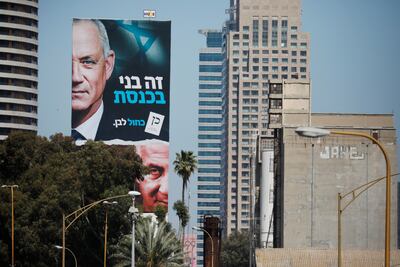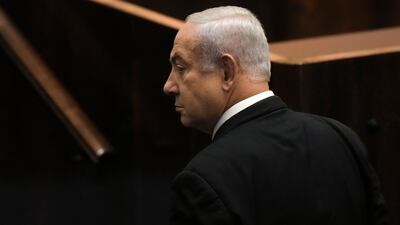In less than a month, Israel will hold its fifth national election in four years. The Israeli media is filled with endless commentary, reports of polls showing who’s up and who’s down, early finger-pointing assessing blame, and through it all, a pervasive sense of gloom acknowledging that whatever the vote tally, the future will be no brighter or more certain than the present.
This election, like those that preceded it, is mainly about one big concern: will Benjamin Netanyahu return as the head of government? There are other issues, to be sure, like whether the hardline ultra-religious parties will hold sway over a range of policies that give their sect privileges in the implementation of laws that affect their followers and the rights of Jews who are not ultra-Orthodox, or whether Mr Netanyahu will be held accountable in the criminal proceedings against him that have been dragging on in court awaiting the outcome of the election. But for a majority of Israeli voters and, it appears, for US policymakers, the central issue being decided on November 1 is: “Will the future of Israel be one with or without Mr Netanyahu?”
As the weekly polls demonstrate, the outcome of this election will be as muddy as the last four. The coalition of parties supporting Mr Netanyahu could reach the magic number of 61 Knesset seats (a simple majority) or they may secure only 59 or 60 seats bringing paralysis and calls for a sixth election. There are no current polls that give a clear 61 seats to the not-Netanyahu crowd.
The only way that either the “with” or “without” bloc could rise comfortably above 61 would be with the inclusion of an Arab party. That, however, appears unlikely. Having denounced the current “Change government” for including a conservative Arab party in its coalition (despite having courted them himself), it’s unlikely that Mr Netanyahu would include them now. The same holds true for the anti-Netanyahu coalition, with one of the major parties in that camp having expressed deep reservations about serving in another coalition government that was dependent on Arab votes.
As a result, even if the Netanyahu coalition receives 59 seats and the opposition wins just 56 seats and is in a position to win control of government with even the passive support of an Arab party, it’s likely that such a government will be relentlessly hounded by Mr Netanyahu as a “minority” (meaning that it was made up of a minority of Jews) government – in the same way that he and Ariel Sharon hounded the government of Yitzhak Rabin in the 1990s.
If Netanyahu had been the head of government, the US might have been inclined to publicly criticise his actions
In the lead-up to the election there was considerable jockeying – splitting and combining – that took place amongst the parties on both the left and right. Once seen as a rising star on the right, Ayelet Shaked formed a new party and immediately plummeted into oblivion.
Further to the right, the ultra-nationalist, racist Kahanist party (that calls for the exclusion of both Palestinian citizens of Israel and the West Bank) has been catapulted into a dominant role in the Netanyahu camp and is now expected to win as many as 12 seats.
On the Arab side, splits in the once-unified Joint Arab List that won 15 seats a few years back, will probably reduce the number of seats Arabs will win to eight or thereabouts – largely because of Arab voters having lost confidence in the Israeli system. It has been especially irritating to read Israeli commentators point to this decline in Arab clout as a reason Mr Netanyahu might win the election. A clear example of “blaming the victims”.
In an article I wrote before the last Israeli election, just 19 months ago, I expressed the concern that ousting Mr Netanyahu would not only fail to improve Palestinian lives and rights, but also might make them worse for two reasons.
In the first place, I feared that because it was based on a fragile coalition, the “Change government” would feel the need to protect its right flank by demonstrating both toughness vis-a-vis Palestinians and support for the settlement enterprise. At the same time, precisely because it was an anti-Netanyahu coalition that included parties from the centre and right and even a conservative Arab party, the “Change government” would be heralded by liberals in the US who would give it licence to pursue whatever policies it needed to remain in power. This is exactly what happened.
The “Change government” followed the very same policies as the one that preceded it. In some cases, they were worse. Settlements grew and expanded; land confiscations continued, as did the release of “state lands” for the exclusive use of settlers; repression intensified, including the use of deadly force and mass arrests; provocations by settlers in Jerusalem and the West Bank were largely met with a blind eye; and policies designed to weaken the Palestinian Authority continued to be standard operating procedure.
If anything changed, it was the silence of the US in response to these “Change government” behaviours. It appears that the guiding principle of US policy towards the Israeli-Palestinian arena has been pathetically reduced to doing nothing that will damage the chances of the anti-Netanyahu forces staying in power and now winning in November – with Palestinians paying a steep price in life and liberty.
What’s most troubling is that if Netanyahu had been the head of government, the US might have been inclined to publicly criticise his actions. But the “Change” crowd received nary a slap on the wrist, except for an occasional expression of US “concern”.
So here we are a year and a half later, with yet another Israeli election with the same concerns and, most likely, the same outcome. The only big issue, as before, will be whether Mr Netanyahu is returned as the head of government. Precisely because it might be the only way to rip off the veneer of “Change” and force the US liberal establishment to confront the horrifying reality of Israeli policies toward Palestinians and act against them, I’m forced to hope for a Netanyahu win.
Jebel Ali card
1.45pm: Maiden Dh75,000 1,400m
2.15pm: Handicap Dh90,000 1,400m
2.45pm: Maiden Dh75,000 1,000m
3.15pm: Handicap Dh105,000 1,200m
3.45pm: Maiden Dh75,000 1,600m
4.15pm: Handicap Dh105,000 1,600m
4.45pm: Handicap Dh80,000 1,800m
The National selections
1.45pm: Cosmic Glow
2.15pm: Karaginsky
2.45pm: Welcome Surprise
3.15pm: Taamol
3.45pm: Rayig
4.15pm: Chiefdom
4.45pm: California Jumbo
UAE squad
Esha Oza (captain), Al Maseera Jahangir, Emily Thomas, Heena Hotchandani, Indhuja Nandakumar, Katie Thompson, Lavanya Keny, Mehak Thakur, Michelle Botha, Rinitha Rajith, Samaira Dharnidharka, Siya Gokhale, Sashikala Silva, Suraksha Kotte, Theertha Satish (wicketkeeper) Udeni Kuruppuarachchige, Vaishnave Mahesh.
UAE tour of Zimbabwe
All matches in Bulawayo
Friday, Sept 26 – First ODI
Sunday, Sept 28 – Second ODI
Tuesday, Sept 30 – Third ODI
Thursday, Oct 2 – Fourth ODI
Sunday, Oct 5 – First T20I
Monday, Oct 6 – Second T20I
Diriyah%20project%20at%20a%20glance
%3Cp%3E-%20Diriyah%E2%80%99s%201.9km%20King%20Salman%20Boulevard%2C%20a%20Parisian%20Champs-Elysees-inspired%20avenue%2C%20is%20scheduled%20for%20completion%20in%202028%0D%3Cbr%3E-%20The%20Royal%20Diriyah%20Opera%20House%20is%20expected%20to%20be%20completed%20in%20four%20years%0D%3Cbr%3E-%20Diriyah%E2%80%99s%20first%20of%2042%20hotels%2C%20the%20Bab%20Samhan%20hotel%2C%20will%20open%20in%20the%20first%20quarter%20of%202024%0D%3Cbr%3E-%20On%20completion%20in%202030%2C%20the%20Diriyah%20project%20is%20forecast%20to%20accommodate%20more%20than%20100%2C000%20people%0D%3Cbr%3E-%20The%20%2463.2%20billion%20Diriyah%20project%20will%20contribute%20%247.2%20billion%20to%20the%20kingdom%E2%80%99s%20GDP%0D%3Cbr%3E-%20It%20will%20create%20more%20than%20178%2C000%20jobs%20and%20aims%20to%20attract%20more%20than%2050%20million%20visits%20a%20year%0D%3Cbr%3E-%20About%202%2C000%20people%20work%20for%20the%20Diriyah%20Company%2C%20with%20more%20than%2086%20per%20cent%20being%20Saudi%20citizens%0D%3C%2Fp%3E%0A
The White Lotus: Season three
Creator: Mike White
Starring: Walton Goggins, Jason Isaacs, Natasha Rothwell
Rating: 4.5/5
The years Ramadan fell in May
In numbers: China in Dubai
The number of Chinese people living in Dubai: An estimated 200,000
Number of Chinese people in International City: Almost 50,000
Daily visitors to Dragon Mart in 2018/19: 120,000
Daily visitors to Dragon Mart in 2010: 20,000
Percentage increase in visitors in eight years: 500 per cent
The First Monday in May
Director: Andrew Rossi
Starring: Anna Wintour, Karl Lagerfeld, John Paul Gaultier, Rihanna
Three stars
Company%20Profile
%3Cp%3E%3Cstrong%3ECompany%20name%3A%3C%2Fstrong%3E%20Cargoz%3Cbr%3E%3Cstrong%3EDate%20started%3A%3C%2Fstrong%3E%20January%202022%3Cbr%3E%3Cstrong%3EFounders%3A%3C%2Fstrong%3E%20Premlal%20Pullisserry%20and%20Lijo%20Antony%3Cbr%3E%3Cstrong%3EBased%3A%3C%2Fstrong%3E%20Dubai%3Cbr%3E%3Cstrong%3ENumber%20of%20staff%3A%3C%2Fstrong%3E%2030%3Cbr%3E%3Cstrong%3EInvestment%20stage%3A%3C%2Fstrong%3E%20Seed%3C%2Fp%3E%0A
NATIONAL%20SELECTIONS
%3Cp%3E6.00pm%3A%20Heros%20de%20Lagarde%3Cbr%3E6.35pm%3A%20City%20Walk%3Cbr%3E7.10pm%3A%20Mimi%20Kakushi%3Cbr%3E7.45pm%3A%20New%20Kingdom%3Cbr%3E8.20pm%3A%20Siskany%3Cbr%3E8.55pm%3A%20Nations%20Pride%3Cbr%3E9.30pm%3A%20Ever%20Given%3C%2Fp%3E%0A
Company%20Profile
%3Cp%3E%3Cstrong%3ECompany%20name%3A%3C%2Fstrong%3E%20myZoi%3Cbr%3E%3Cstrong%3EStarted%3A%3C%2Fstrong%3E%202021%3Cbr%3E%3Cstrong%3EFounders%3A%3C%2Fstrong%3E%20Syed%20Ali%2C%20Christian%20Buchholz%2C%20Shanawaz%20Rouf%2C%20Arsalan%20Siddiqui%2C%20Nabid%20Hassan%3Cbr%3E%3Cstrong%3EBased%3A%3C%2Fstrong%3E%20UAE%3Cbr%3E%3Cstrong%3ENumber%20of%20staff%3A%3C%2Fstrong%3E%2037%3Cbr%3E%3Cstrong%3EInvestment%3A%3C%2Fstrong%3E%20Initial%20undisclosed%20funding%20from%20SC%20Ventures%3B%20second%20round%20of%20funding%20totalling%20%2414%20million%20from%20a%20consortium%20of%20SBI%2C%20a%20Japanese%20VC%20firm%2C%20and%20SC%20Venture%3C%2Fp%3E%0A
All Black 39-12 British & Irish Lions
'Outclassed in Kuwait'
Taleb Alrefai,
HBKU Press
Mental%20health%20support%20in%20the%20UAE
%3Cp%3E%E2%97%8F%20Estijaba%20helpline%3A%208001717%3Cbr%3E%E2%97%8F%20UAE%20Ministry%20of%20Health%20and%20Prevention%20hotline%3A%20045192519%3Cbr%3E%E2%97%8F%20UAE%20Mental%20health%20support%20line%3A%20800%204673%20(Hope)%3Cbr%3EMore%20information%20at%20hope.hw.gov.ae%3C%2Fp%3E%0A
China and the UAE agree comprehensive strategic partnership
China and the UAE forged even closer links between the two countries during the landmark state visit after finalising a ten-point agreement on a range of issues, from international affairs to the economy and trade and renewable energy.
1. Politics: The two countries agreed to support each other on issues of security and to work together on regional and international challenges. The nations also confirmed that the number of high-level state visits between China and the UAE will increase.
2. Economy: The UAE offers its full support to China's Belt and Road Initiative, which will combine a land 'economic belt" and a "maritime silk road" that will link China with the Arabian Gulf as well as Southeast, South and Central China, North Africa and, eventually, Europe.
3. Business and innovation: The two nations are committed to exploring new partnerships in sectors such as Artificial Intelligence, energy, the aviation and transport industries and have vowed to build economic co-operation through the UAE-China Business Committee.
4. Education, science and technology: The Partnership Programme between Arab countries in Science and Technology will encourage young Emirati scientists to conduct research in China, while the nations will work together on the peaceful use of nuclear energy, renewable energy and space projects.
5. Renewable energy and water: The two countries will partner to develop renewable energy schemes and work to reduce climate change. The nations have also reiterated their support for the Abu Dhabi-based International Renewable Energy Agency.
6. Oil and gas: The UAE and China will work in partnership in the crude oil trade and the exploration and development of oil and natural gas resources.
7. Military and law enforcement and security fields: Joint training will take place between the Chinese and UAE armed forces, while the two nations will step up efforts to combat terrorism and organised crime.
8. Culture and humanitarian issues: Joint cultural projects will be developed and partnerships will be cultivated on the preservation of heritage, contemporary art and tourism.
9. Movement between countries: China and the UAE made clear their intent to encourage travel between the countries through a wide-ranging visa waiver agreement.
10. Implementing the strategic partnership: The Intergovernmental Co-operation Committee, established last year, will be used to ensure the objectives of the partnership are implemented.






